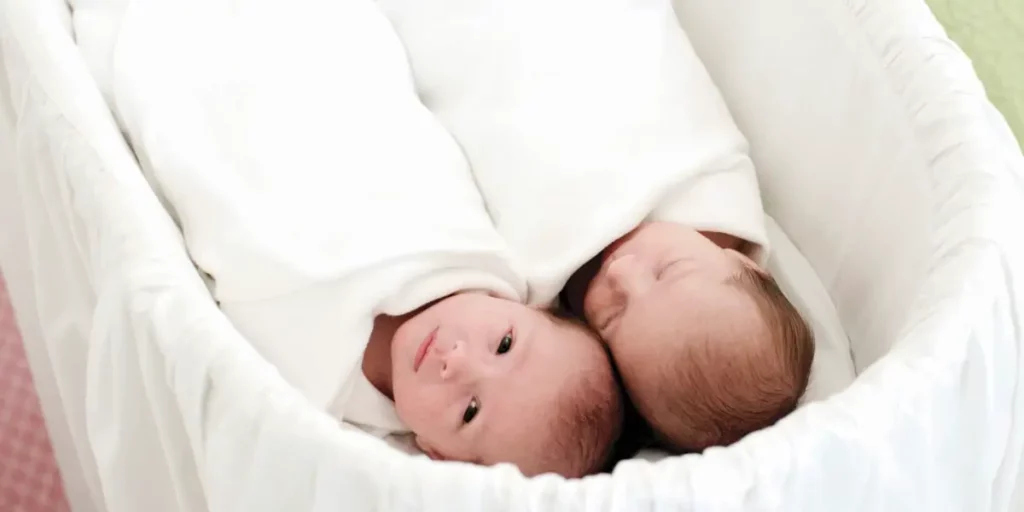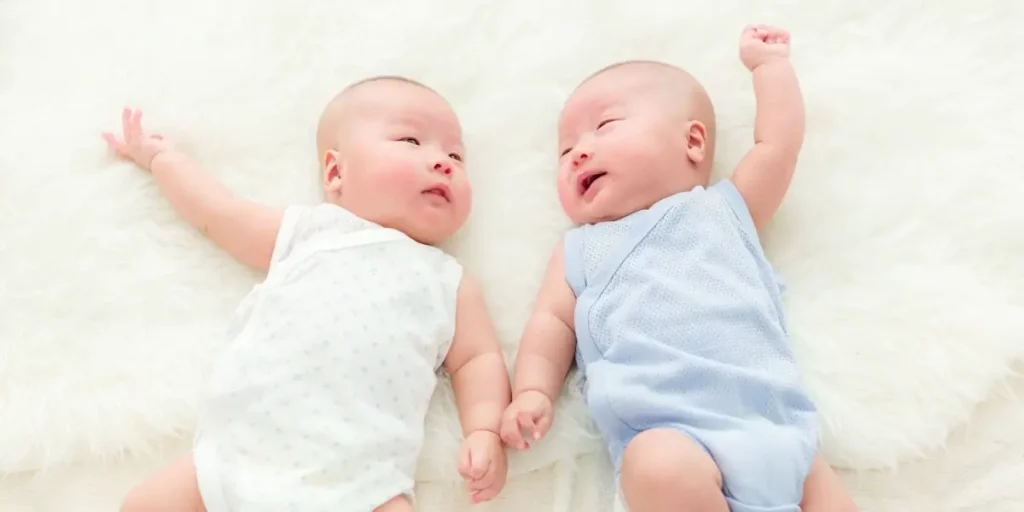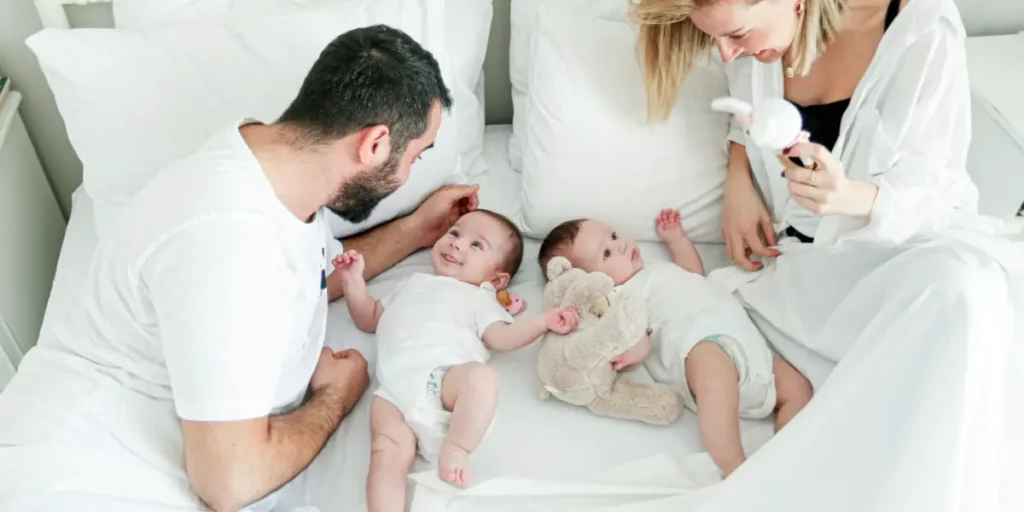
Raising twins is a unique and rewarding experience but can also be overwhelming. Parents of twins often struggle to find the right balance in sleep training their children. However, with the right guidance and patience, you can successfully sleep train your twin babies for a good night’s sleep.
This blog post will discuss the best practices for sleep training twins and how to find the right balance that works for your family.
Things Parents Need to Know About Sleep Training Twins
When it comes to sleep training twins, it is essential to have realistic expectations. Sure, your twins might not have the same sleep schedule now, but they will soon enough with the right sleep training methods.
Remember that two babies require double the work and attention, so it may take longer for your children to master healthy sleep habits than a single infant. Here are some tips for success:
1. Create a Consistent and Predictable Bedtime Routine for Both Babies
Sleep training twins can be tricky, and one of the key steps to successful sleep training is creating a consistent and predictable bedtime routine for both babies.
To ensure that their sleep schedules remain in sync, parents should make sure that the same calming activities are done with the twins at bedtime, such as bath time, reading a story, or listening to soothing music.
It’s important to create a relaxing environment; dimming lights and avoiding stimuli such as televisions or iPads before bedtime can help tremendously.
Establishing a consistent bedtime also sets up your twins to successfully establish healthy sleep habits that will last through toddlerhood and beyond. When it comes to sleep training twins, creating a predictable and consistent bedtime routine is essential for your childre’s peaceful sleep.
2. Allow Flexibility
Parents of twins must be prepared for the challenge of implementing an effective sleep training strategy. One crucial factor that should not be overlooked is flexibility.
Twins tend to respond differently to sleep training due to their individual sleeping cycles and natural personality traits, so parents should remain open-minded while they navigate the process.
Each baby will likely require a different mix of methods and approaches, and even the same method could result in different reactions depending on which twin you’re dealing with.
Offering distinct approaches tailored to each twin’s needs may yield better results than treating them as one unit regarding sleep training.
Being steadfast in boundaries while allowing room for flexibility will ensure parents can lay a secure foundation for their twins’ sleeping success.

3. Find Support from Others
Parents often find that sleep training twins is a daunting task and one that can require the help and support of others.
Whether it’s having a friend stay over while they try different methods or reaching out to family and friends via text or email to receive helpful advice. Many parents attest that additional support was essential to their journey with sleep training their twins.
Even if it feels like an exhausting process, finding someone who will show understanding, empathy, and willingness to help out in any way needed can make all the difference in successfully sleep training twins.
4. Get Professional Help
For parents of multiples, seeking professional help from a sleep coach or medical professional can be extremely beneficial and helpful in navigating the process of sleep training twins.
A qualified expert can provide personalized advice based on your family’s individual needs, which could make all the difference in helping to create healthy sleep habits that last.
However, this is not always necessary because sleep training twins can easily be done at home. Still, it can be a great way to ensure that your babies are getting the best possible sleep, and gaining access to personalized guidance can make the process much easier for parents.
Useful Techniques to Sleep Train Twins
Once parents have established the right sleep environment and secure support system, they can proceed with the actual sleep training techniques. Some of the most effective techniques used in sleep training twins include:
1. Double-Duty Feedings
One of the most effective techniques to sleep-train twins is to feed them both simultaneously. This helps ensure feeding them is done before bedtime, and the babies are full and ready for sleep when it’s time to settle down. Once the babies are both full, parents can then start their sleep routine.
2. Post-Awakening Checks
After babies have been put to bed, parents can do a post-awakening check after 45 minutes or so. This means that one parent can check on the twins and make sure they are asleep.
If they’re still awake, keeping them calm by speaking softly and offering a gentle touch is important. This helps to reinforce the fact that bedtime is for sleeping and not playing.
3. Having a Bedtime Routine
Creating a structured and consistent bedtime routine can be beneficial for helping twins sleep better at night. Keeping the routine simple and short is often best, as it allows babies to focus on the important parts of the routine, such as bathing and storytime.

4. Fading Method
The fading method is a popular approach used to sleep train twins. This is because this method allows parents to slowly ease their twins into a sleep routine over time. The fading method can be used to gradually shift bedtime earlier and later, or reduce the amount of time babies spend in their cribs until they’re eventually able to put themselves to sleep without much assistance.
5. Swaddling
Swaddling is a great technique to help ensure that twins stay asleep during the night. It also helps them feel secure and less likely to wake up due to startle reflexes.
If you are having a hard time sleep training your twins, you can use a swaddle that is specially designed for babies of multiple births. This type of swaddle is larger and offers more coverage than a traditional swaddle. Therefore, it can help keep both babies feeling secure and comfortable while they sleep.
6. White Noise
Using white noise machines or sound machines with calming tunes can be incredibly helpful in sleep training twins. This is because white noise helps block out any potential distractions, making it easier for babies to stay asleep undisrupted by outside noises.
Make sure that you condition your babies to the sound of white noise before bed. This will help them become familiar with it and create a sense of security and comfort that can make falling asleep easier.
7. Creating a Secure Environment
Making sure that the twins’ environment is secure and comfortable is also an effective sleep training method. This is because the environment in which your babies are sleeping can have a major impact on the success of sleep training.
Try to keep their cribs free from distractions, and ensure the room is dark and quiet. Room-darkening curtains or blackout shades can be especially beneficial for ensuring babies stay asleep throughout the night.
8. Positive Reinforcement
Lastly, sleep training twins becomes more effective with positive reinforcement. This is because babies respond well to positive reinforcement, and it helps them understand that sleep is a good thing.
For example, a good reinforcement for babies who have successfully slept through the night is to offer them a special reward, such as a favorite toy or an extra hug. This helps reinforce positive behavior and encourages babies to sleep better in the future.
Overall, parents need to remember that every baby is different, and there is no one-size-fits-all approach when it comes to helping babies get a good night’s rest. However, with patience, consistency, and the right techniques, parents can do their best to ensure their twins get the rest they need.
What Are the Consequences of Not Sleep Training Twins?
Some parents might not find it necessary to sleep train their twins, or they may find the process too challenging. However, this could be detrimental to the twins’ development and sleeping habits.
Without sleep training, the babies will likely become overtired from not getting enough rest during the day and thus struggle to fall asleep at night. This can lead to long nights of crying and difficulty sleeping, not just for the twins but also for their parents.
Below are more consequences of not sleep-training twins:
1. Irritability and Behavioral Problems Due to Lack of Rest
Failing to properly sleep train twins can lead to several consequences, including increased irritability and behavioral problems. These issues can be caused by overly exhausted babies and an inability to effectively regulate their emotions due to a lack of proper restorative sleep.
Families with twins must create and adhere to a sleep schedule to avoid these negative impacts on the babies’ development. Incorporating regular naps into the day and sticking to consistent evening sleep times can help ensure that your twin’s needs are met and that they are receiving adequate amounts of restful sleep.

2. Difficulty Focusing and Learning Throughout the Day
Sleep is an essential component of good health, particularly for developing children. Without enough sleep, the ability to learn, focus and maintain healthy functioning can suffer greatly. When it comes to twins in particular, not sleep training them can lead to chronic fatigue and the inability to concentrate properly throughout the day.
This means that their development could be stunted while learning basic information, such as reading and math, due to difficulty focusing or processing new material.
Furthermore, this lack of sleep can cause problems with problem-solving tasks as well as impair functions such as memory, reasoning, and decision-making.
Therefore, if you have twins, it is important that you introduce some sort of sleep training routine as soon as possible so that your children can get the adequate rest needed for their growing minds.
3. Sleep Schedule Inconsistencies
Not properly sleep training twins can lead to many sleep issues. Most notably, twin parents may experience significant sleep schedule inconsistencies with their babies. This means that naps will become distributed unevenly throughout the day, and nighttime sleep may also occur erratically.
Not only is this disruptive for both the parents and the babies, but it also can lead to long-term consequences of exhaustion and poor health in the parent or caregiver, as well as an irregular sleeping pattern in the babies themselves.
The key is to be proactive in finding a routine that works for everyone involved so that all family members get the rest they need for optimal well-being and productivity.
4. Increased Risk of Exhaustion for Both Parents and Babies
The lack of sleep training for twins can, unfortunately, lead to several consequences, including an increased risk of exhaustion for both the parents and their children. This is because parents cannot develop consistent routines that allow their babies to learn healthy sleeping habits.
Without a regular schedule, babies may cry longer and wake up more frequently at night, leading to significantly less sleep time for the entire family. Additionally, if left unaddressed, this issue can have long-lasting repercussions on your child’s behavior or health down the line.
Parents should find ways to meet their children’s needs while encouraging healthy sleeping patterns to reduce the risks associated with exhausted parents and babies.
When Should You Start Sleep Training Twins?
Sleep training twins can be tricky but beneficial, as sleep is important for a child’s physical and mental development. If you are considering sleep training your twins, the best time to begin is when they reach 4–6 months of age, when their sleep schedules have become more predictable.
During this stage, parents should establish good sleep habits for their twins, such as sticking to a routine for naps and bedtime that works best for everyone.
Additionally, it is vital to ensure each infant has their own safe sleeping space, if possible, to avoid any disruptions from one baby waking up the other during the night. Having realistic expectations and following sound sleep strategies will give your twins a strong foundation for healthy sleeping habits later in life.
Should Twins Be Separated When They Are Being Sleep-Trained?
When sleep-training twins, it is important to consider the option of separating them if they are having difficulty sleeping independently. This can be a great way to create a secure and peaceful environment for each individual child while helping to encourage better sleeping habits overall.
If possible, try placing their beds in the same room, so your babies still feel close to each other but far away enough to reduce distractions. This can be a great option for parents having difficulty establishing regular sleep routines with their twins and wanting to give them the best chance at getting the rest they need.
Bottom Line
Sleep training twins can be a difficult, albeit important, process for both the parents and their children.
Not only does it help ensure that everyone gets enough rest, but it also prevents chronic fatigue, sets up healthy sleeping habits, and reduces the risk of exhaustion in babies and parents.
With realistic expectations and sound strategies in place, sleep training your twins can be successful, giving your family the restful nights of sleep you all deserve.





Comments (7)
Mariesays:
December 31, 2023 at 8:15 pmSpot on with this write-up, I honestly believe this site needs far more
attention. I?ll probably be returning to rad hrough more, thanks for the info!
my site :: californian yucca – http://clcanorthcoastchapter.org/,
network marketingsays:
January 2, 2024 at 6:40 pmHi there superb website! Does running a blog similar to this require a
lot of work? I’ve very little understanding of programming however
I had been hoping to start my own blog in the near future.
Anyways, should you have any recommendations or tips for new blog owners
please share. I understand this is off subject nevertheless I simply had to ask.
Many thanks!
war museumsays:
January 3, 2024 at 2:04 pmHi! I know this is kind of off-topic but I had to ask.
Does building a well-established website like yours require a lot of work?
I am brand new to writing a blog but I do write in my journal everyday.
I’d like to start a blog so I can share my experience
and feelings online. Please let me know if you have any ideas or tips for brand new
aspiring blog owners. Thankyou!
wedding venuesays:
January 3, 2024 at 9:55 pmI do not know whether it’s just me or if perhaps everyone else encountering issues
with your site. It appears like some of the text in your posts are running
off the screen. Can someone else please comment and let me know if this is happening to them as well?
This might be a problem with my internet browser because
I’ve had this happen previously. Many thanks
us education rankingssays:
January 4, 2024 at 2:34 pmHi there everyone, it’s my first go to see at this site, and post is in fact
fruitful for me, keep up posting these types of content.
image maskingsays:
January 5, 2024 at 8:40 pmAppreciating the dedicatin you put into your website and detiled information you present.
It’s nice to come across a blog every once in a while that
isn’tthe same old rehashed material. Wonderful read!
I’ve blokmarked your site and I’m including your RSS
feeds to my Google account.
My web page … image masking
fantasy sportssays:
January 5, 2024 at 11:06 pmFantastic post however I was wondering if
you could write a litte more on this topic?
I’d be very grateful if you could elaborate a little bit more.
Many thanks!